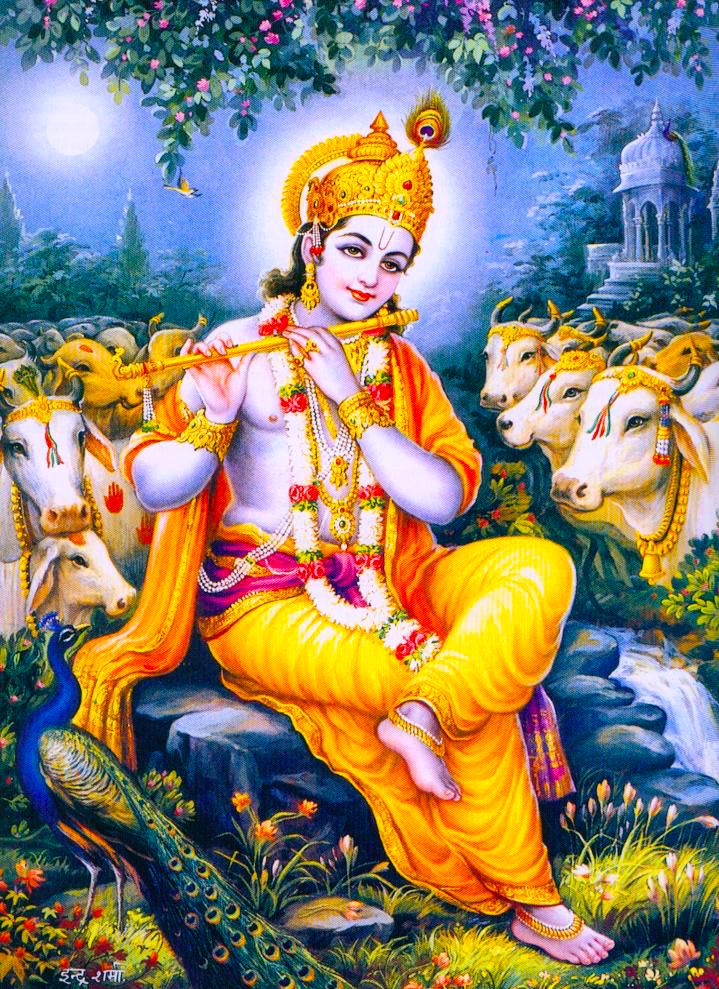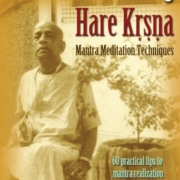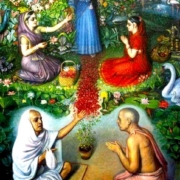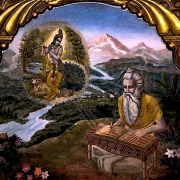The Value of Cintamani Nama
Mahanidhi Madan Gopal Das
Kṛṣṇa’s holy name–full of mercy, full of compassion, full of affection, full of rasa and full of prema–is the rarest treasure in the world. Without hearing from sastra and saints, however, one can never understand the power, value and benefit of Sri Kṛṣṇa’s divine name, form, attributes, pastimes and holy abode (nama, rupa, guna, lila, dhama). Throughout the Vedas the transcendental glories of the holy name are recounted.
The following verse from the Padma Purana compares the holy name to a cintamani gem, a divine stone that can bestow one’s desired results. Such cintamani gems make up the transcendental land of Kṛṣṇaloka in the spiritual world. This verse clearly describes the transcendental identity of the holy name:
nāma cintāmaṇiḥ kṛṣṇaś, caitanya-rasa-vigrahaḥ
pūrṇaḥ śuddho nitya-mukto, ‘bhinnatvān nāma-nāminoḥ
The holy name of Kṛṣṇa is a transcendental wish-fulfilling gem (cintamani); it is the embodiment of all consciousness and sentiments; it is complete; it is pure; it is ever free because the name of Kṛṣṇa and Kṛṣṇa Himself are one and the same.
Srila Prabhupada gives a wonderful expanded translation of this verse:
“The holy name of Kṛṣṇa is transcendentally blissful. It bestows all spiritual benedictions, for it is Kṛṣṇa Himself, the reservoir of all pleasure. Kṛṣṇa’s name is complete, and it is the form of all the transcendental mellows. It is not a material name under any condition, and it is no less powerful than Kṛṣṇa Himself. Since Kṛṣṇa’s name is not contaminated by the material qualities, there is no question of its being involved with māyā. Kṛṣṇa’s name is always liberated and spiritual. It is never conditioned by the laws of material nature. This is because the name of Kṛṣṇa and Kṛṣṇa Himself are identical.” (Caitanya Caritamrita Madhya 17.133 p.)
The following story from Vaisnava tradition illustrates the incomparable value of Kṛṣṇa’s holy name.
Once a disciple asked his guru for the topmost secret of bhajana. The guru replied, “The most confidential secret of bhajana is to always chant the maha-mantra–Hare Kṛṣṇa Hare Kṛṣṇa Kṛṣṇa Kṛṣṇa Hare Hare, Hare Rama Hare Rama Rama Rama Hare Hare!”
After leaving his guru’s asrama, the disciple met some poor washermen who were chanting Hare Kṛṣṇa while scrubbing clothes beside the Yamuna. He then heard some little girls chanting Hare Kṛṣṇa while collecting cow dung. When the disciple hired a ricksaw, the skinny old driver chanted Hare Kṛṣṇa all the way back to the asrama.
Meeting his guru, the disciple expressed a doubt about the maha-mantra, “Gurudeva! What kind of secret have you given to me that is known to every dhobi, ricksaw-walla and little girl in India? Is this really the most confidential secret of bhajana?”
Instead of a long explanation, the guru handed the disciple a precious jewel and said, “Show this jewel to the dhobi, ricksaw-walla and little girls, and see if they appreciate its value.” The disciple then showed the priceless jewel to the illiterate washermen, but they could not detect the value of the jewel. They said they would gladly accept it, and use it for beating their dirty cloth. The disciple refused to give them the gem, saying, “You have to pay the proper price for it. A stone or piece of wood is sufficient for beating dirty cloth.”
Upon seeing the jewel, the ricksaw-walla said, “Since it is a little rough, I think it is just suitable for scraping off the dry skin from my feet.” “Are you crazy!” said the disciple as he walked on to show the village girls. Failing to recognize the true worth of the jewel, the girls said, “We could use the jewel to pack our cow dung.”
The disciple again met with his guru and said, “Gurudeva! Nobody wanted to pay the proper price for the jewel. Nor could anyone appreciate the great value of the gem.”
“Yes, in the same way,” said the guru, “most people cannot appreciate the value of the holy name. For this reason, they are indifferent to the chanting of Hare Kṛṣṇa. The Hare Kṛṣṇa maha-mantra is an open secret that is revealed only to the qualified.”
An excerpt from the book Art of Chanting










Leave a Reply
Want to join the discussion?Feel free to contribute!